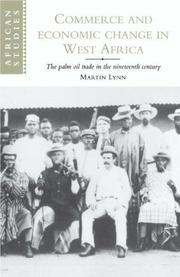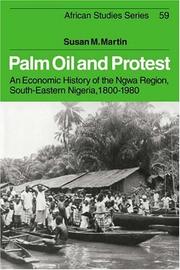Book
ISBN: 9781469662893 Year: 2021 Publisher: Chapel Hill (N.C.) : University of North Carolina press,
Abstract | Keywords | Export | Availability | Bookmark
 Loading...
Loading...Choose an application
- Reference Manager
- EndNote
- RefWorks (Direct export to RefWorks)
"Oil palms are ubiquitous--grown in nearly every tropical country, they supply the world with more edible fat than any other plant and play a role in scores of packaged products, from lipstick and soap to margarine and cookies. And as Jonathan E. Robins shows, sweeping social transformations carried the plant around the planet. By telling the story of the oil palm across multiple centuries and continents, Robins demonstrates how the fruits of an African palm tree became a key commodity in the story of global capitalism, beginning in the eras of slavery and imperialism, persisting through decolonization, and stretching to the present day"--
Capitalism. --- Oil palm --- Palm oil industry --- Palm oil industry. --- Industrial applications. --- History --- Political aspects --- History. --- Africa. --- Southeast Asia.
Book
Year: 1985 Publisher: Quito, Ecuador : CEDIS : CONFENIAE,
Abstract | Keywords | Export | Availability | Bookmark
 Loading...
Loading...Choose an application
- Reference Manager
- EndNote
- RefWorks (Direct export to RefWorks)
Indians of South America --- Quechua Indians --- Palm oil industry --- Social conditions. --- Social aspects.
Book
Year: 2018 Publisher: Leuven KU Leuven
Abstract | Keywords | Export | Availability | Bookmark
 Loading...
Loading...Choose an application
- Reference Manager
- EndNote
- RefWorks (Direct export to RefWorks)
Oil industries --- Fossil fuels --- Nigeria --- Petroleum industry and trade --- Palm-oil industry
Book
ISBN: 3631738544 3631738536 Year: 2018 Publisher: Berlin : Peter Lang,
Abstract | Keywords | Export | Availability | Bookmark
 Loading...
Loading...Choose an application
- Reference Manager
- EndNote
- RefWorks (Direct export to RefWorks)
By combining Marxism with feminist political economy and political ecology, this book develops a theoretical frame about the continuity of plundering and looting in the region of Tumaco-San Lorenzo at the Pacific coast of Colombia and Ecuador, as well as the long history of resistance that Black-Afro communities of artisan fishers and small farmers have carried out for more than five centuries. Using the palm oil industry as example, the research shows the features of "primitive or primary accumulation" in these places. From a historical perspective, the author exposes the imperialist character of the palm oil industry. She analyses the connections between policies makers, scientists and businessmen in the development of this agribusiness.
Palm oil industry --- Black people --- Nariño (Colombia : Department) --- Esmeraldas (Ecuador : Province) --- Economic conditions.

ISBN: 0521590744 0521893267 9780521893268 9780521590747 9780511582035 0585033749 9780585033747 051158203X 0511000855 Year: 1997 Publisher: Cambridge Cambridge University Press
Abstract | Keywords | Export | Availability | Bookmark
 Loading...
Loading...Choose an application
- Reference Manager
- EndNote
- RefWorks (Direct export to RefWorks)
Martin Lynn's study investigates the transition period of West African history when the trading system moved from slave-based trade to so-called 'legitimate' trade. Palm oil trade was especially important, having grown out of the slave trade.
Palm oil industry --- History --- West Africa --- Huile de palme --- History of Africa --- anno 1800-1899 --- Industrie --- Histoire --- Arts and Humanities

ISBN: 051158203X 0511000855 0521590744 0521893267 Year: 2002 Publisher: Cambridge Cambridge University Press
Abstract | Keywords | Export | Availability | Bookmark
 Loading...
Loading...Choose an application
- Reference Manager
- EndNote
- RefWorks (Direct export to RefWorks)
A key theme in the West African trading system of the nineteenth century is the transition from the slave trade to 'legitimate' commerce, and its significance for the African societies of the region. In this period of transition, trade in palm oil was at the core of relations between Britain and West Africa, and of immense importance to the economies of large parts of West Africa. Martin Lynn's authoritative and comprehensive study of the palm oil trade covers the whole of this critical period for all of West Africa. It explains how the palm oil trade grew organically out of the organisation of the slave trade. The situation changed sharply with the development of steam communication between Britain and West Africa from the 1850s, leading to severe problems for the commerce in the second half of the century, the erosion of African brokers' powers, and the restructuring of the trade thereafter. The result was a crisis within the trade towards the end of the century and, eventually, with the arrival of colonial rule, the ending of the long established structures of the commerce.
Palm oil industry --- Vegetable oil industry --- History --- Arts and Humanities --- History of Africa --- anno 1800-1899 --- West Africa

ISBN: 0511521596 0521343763 0521025575 Year: 1988 Volume: 59 Publisher: Cambridge : Cambridge University Press,
Abstract | Keywords | Export | Availability | Bookmark
 Loading...
Loading...Choose an application
- Reference Manager
- EndNote
- RefWorks (Direct export to RefWorks)
The Ngwa region lies in the heart of the Nigerian palm belt. Palm oil is one of the oldest foodstuffs of the region and has also been an export crop, produced mainly by women, from the early nineteenth century to the present day. This 1988 book describes the rise and fall of the oil palm export industry. In contrast to the views of both dependency and vent-for-surplus theorists, it is shown that patterns of export growth and capital investment were heavily influenced by locally inspired changes in food production methods, gender and intergenerational relationships. The processes of change within the domestic and export economies became increasingly closely intertwined after 1924, when African coastal middlemen began to settle further inland and to spread the knowledge of cassava and Christianity. This book draws upon a wide range of economic, botanical, anthropological and historical studies as well as on colonial archives, but its heart lies in the oral evidence and life histories generously provided by Ngwa men and women.
Palm oil industry --- Igbo (African people) --- Ibo (African people) --- Ibo tribe --- Ethnology --- Vegetable oil industry --- History --- Social Sciences --- Political Science
Book
ISBN: 9814311456 Year: 2013 Publisher: Singapore : ISEAS Publishing,
Abstract | Keywords | Export | Availability | Bookmark
 Loading...
Loading...Choose an application
- Reference Manager
- EndNote
- RefWorks (Direct export to RefWorks)
"This engaged and vital edited volume brings together the varied viewpoints of academics, consultants and activists all concerned with the astonishing expansion of palm oil as a globally traded commodity. It reveals how this complex, contested and controversial expression of globalization transcends narrow national and sectoral interests, stimulating a transnational exchange of goods, capital and labour, as well as laws, norms, values and even understanding. Compelling, readable and insightful, the study shows that corporate responses to civil societys concerns about palm oils role in global warming, human rights abuses, land grabbing and biodiversity loss, now need to be complemented by legal, regulatory and governance reforms to be effective." - Marcus Colchester, Director, Forest Peoples Programme
Oil palm --- Palm oil industry --- Vegetable oil industry --- African oil palm --- Elaeis guineensis --- Elaeis melanococca --- Palm oil tree --- Elaeis --- Oilseed plants --- Palm oil
Book
ISBN: 9780226515946 022651594X 9780226516134 022651613X Year: 2018 Publisher: Chicago London The University of Chicago Press
Abstract | Keywords | Export | Availability | Bookmark
 Loading...
Loading...Choose an application
- Reference Manager
- EndNote
- RefWorks (Direct export to RefWorks)
"Palma africana represents the latest attempt by anthropologist Michael Taussig to make sense of the threat to life, human and nonhuman, that characterizes the contemporary moment. In Colombia, where Taussig has worked for decades, palm oil plantations are spreading in areas that were once cornucopias of animal, bird, and plant life. Deforestation and habitat loss are the first effects."--Provided by publisher.
Oil palm --- Palm oil industry --- Ethnology --- Plantations --- Social aspects --- Economic aspects --- Environmental aspects --- Taussig, Michael T. --- Colombia --- Social conditions. --- Environmental conditions.
Book
ISBN: 147802223X Year: 2021 Publisher: Durham : Duke University Press,
Abstract | Keywords | Export | Availability | Bookmark
 Loading...
Loading...Choose an application
- Reference Manager
- EndNote
- RefWorks (Direct export to RefWorks)
"Tania Murray Li and Pujo Semedi examine the structure and governance of contemporary palm oil plantations in Indonesia, showing how massive forms of capitalist production and control over the palm oil industry replicate colonial-style relations that undermine citizenship."--
Palm oil industry --- Plantation workers --- Farms, Small --- Sustainable development --- Rural development --- Social aspects --- Environmental aspects --- Social conditions. --- Government policy --- global capitalism.

 Search
Search Feedback
Feedback About UniCat
About UniCat  Help
Help News
News